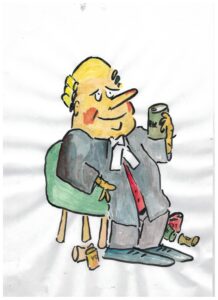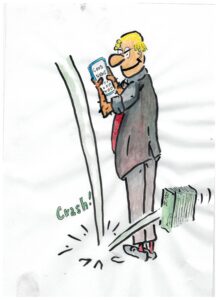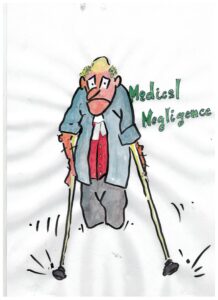Approach this Court should take on appeal – Warren v Coombes
From
Kitgetzis v Roche [2014] VSC 657 (Rush J) |
Case involved motorbike collision with plaintiff notwithstanding plaintiff crossing street against red man signal motorbike rider could be negligent. At first instance the finding was that the applicant (motorcyclist) was negligent and that the respondent (pedestrian) was contributory negligent to the extent of 60 per cent..
Appeal – applicant denies negligence and in the alternative alleges contributory negligence on the part of the respondent.
Illustration of the role of an appeal’s court in considering whether the first instance decision with regard to breach of duty of care by motorcyclist may be overturned.
[24] The approach this Court should take on appeal was explained in Warren v Coombes. Gibbs ACJ, Jacobs and Murphy JJ said:
The duty of the appellate court is to decide the case — the facts as well as the law — for itself. In so doing it must recognize the advantages enjoyed by the judge who conducted the trial. But if the judges of appeal consider that in the circumstances the trial judge was in no better position to decide the particular question than they are themselves, or if, after giving full weight to his decision, they consider that it was wrong, they must discharge their duty and give effect to their own judgment. Further there is, in our opinion, no reason in logic or policy to regard the question whether the facts found do or do not give rise to the inference that a party was negligent as one which should be treated as peculiarly within the province of the trial judge. On the contrary we should have thought that the trial judge can enjoy no significant advantage in deciding such a question. The only arguments that can be advanced in favour of the view that an appellate court should defer to the decision of the trial judge on such a question are that opinions on these matters very frequently differ, and that it is in the public interest that there should be finality in litigation. The fact that judges differ often and markedly as to what would in particular circumstances be expected of a reasonable man seems to us in itself to be a reason why no narrow view should be taken of the appellate function. The resolution of these questions by courts of appeal should lead ultimately not to uncertainty but to consistency and predictability, besides being more likely to result in the attainment of justice in individual cases. The interest of the community in the speedy termination of litigation might, no doubt, be an argument in favour of the complete abolition of appeals, although that would be far too high a price to pay merely for finality. However, if the law confers a right of appeal, the appeal should be a reality, not an illusion; if the judges of an appellate court hold the decision of the trial judge to be wrong, they should correct it.( (1979) 142 CLR 531, 552-3.)
……..
[44]On an appeal by way of rehearing such as the present, the appellate court will only interfere if it is satisfied the order the subject of appeal is the result of some legal, factual or discretionary error.( Allesch v Maunz (2000) 203 CLR 172, 180 [23] (Gaudron, McHugh, Gummow and Hayne JJ); Lacey v A-G (Qld) (2011) 242 CLR 573, 597 [57] (French CJ, Gummow, Hayne, Crennan, Kiefel and Bell JJ).)
[45] Obviously enough, it will be necessary for an appeal court conducting an appeal by way of rehearing to re-evaluate the question of contributory negligence for itself if it reaches different conclusions with respect to the primary facts from that of a trial judge. This, however, is not such a case. For the reasons I have explained, I accept the trial judge’s conclusions as to the primary facts. In turn, this is a case in which the trial judge’s finding as to contribution is not to be lightly reviewed. Due deference must be given to the fact that he heard the oral evidence of the relevant witnesses and was immersed in the evidence by the trial process in a way in which this Court is not.(See the observations of Whelan JA in TAC v Cuthbertson [2013] VSCA 29 [34].) This Court must be persuaded he erred in making a multifactorial evaluation of the facts as a whole. I am not persuaded that the judge’s finding as to apportionment was not reasonably open.
Appeals court unltimately agreed with trial judge that appellant (motorcyclist) was also negligent.
SEARCH BLOG POSTS
LATEST BLOG POSTS
- Updated product safety mandatory reporting guidance for suppliers now available
- Pleading fraud – cause and effect is essential
- Does the Trustee’s right of indemnity have priority over the right of beneficiaries in relation to assets?
- Rules of war (in a nutshell) | The Laws Of War
- MH370 Final Report
Past Blog Posts
- December 2021
- September 2021
- August 2021
- May 2021
- April 2021
- March 2021
- August 2020
- February 2020
- September 2019
- February 2019
- December 2018
- July 2018
- April 2018
- December 2017
- May 2017
- February 2017
- December 2016
- November 2016
- October 2016
- September 2016
- August 2016
- April 2016
- March 2016
- October 2015
- September 2015
- August 2015
- May 2014
- April 2014
- March 2014
- January 2014
Categories
- Appeals
- Artificial Intelligence
- Aviation law
- Banking and Finance Law
- Blogs
- Civil Liability Act
- Class Actions
- Coding for lawyers
- common law
- Consumer Claims (TPA)
- Contract Law
- Contractual Interpretation
- Criminal law
- Deeds
- Docassemble
- duty of care
- Engineering Law
- Equity
- Evidence
- Exclusion Clauses
- Execution of documents
- Expert Witness
- featured
- Financial Services
- Fraud
- Fundraising (Chapter 6D)
- General comment
- Home Building Law
- Insurance
- Legal drafting
- Local Court
- Medical Negligence
- MH370
- Motor Accidents
- Negligence
- Occupiers negligence
- Other
- Personal Injury
- Personal Property Securities (PPSA)
- Pleading
- Practice & Procedure
- Products Liability
- Property
- Real Property
- Reasons for a decision
- Securitisation
- Security (Mortgages & Charges)
- Sentencing
- Swaps & Derivatives
- Teaching
- Transactional Law
- Transfer of financial assets in transactions
- Trusts & Trustee Law
- Uncategorized
- War and Weaponry
- Witnesses
SEARCH BLOG POSTS
LATEST BLOG POSTS
- Updated product safety mandatory reporting guidance for suppliers now available
- Pleading fraud – cause and effect is essential
- Does the Trustee’s right of indemnity have priority over the right of beneficiaries in relation to assets?
- Rules of war (in a nutshell) | The Laws Of War
- MH370 Final Report
Past Blog Posts
- December 2021
- September 2021
- August 2021
- May 2021
- April 2021
- March 2021
- August 2020
- February 2020
- September 2019
- February 2019
- December 2018
- July 2018
- April 2018
- December 2017
- May 2017
- February 2017
- December 2016
- November 2016
- October 2016
- September 2016
- August 2016
- April 2016
- March 2016
- October 2015
- September 2015
- August 2015
- May 2014
- April 2014
- March 2014
- January 2014
Categories
- Appeals
- Artificial Intelligence
- Aviation law
- Banking and Finance Law
- Blogs
- Civil Liability Act
- Class Actions
- Coding for lawyers
- common law
- Consumer Claims (TPA)
- Contract Law
- Contractual Interpretation
- Criminal law
- Deeds
- Docassemble
- duty of care
- Engineering Law
- Equity
- Evidence
- Exclusion Clauses
- Execution of documents
- Expert Witness
- featured
- Financial Services
- Fraud
- Fundraising (Chapter 6D)
- General comment
- Home Building Law
- Insurance
- Legal drafting
- Local Court
- Medical Negligence
- MH370
- Motor Accidents
- Negligence
- Occupiers negligence
- Other
- Personal Injury
- Personal Property Securities (PPSA)
- Pleading
- Practice & Procedure
- Products Liability
- Property
- Real Property
- Reasons for a decision
- Securitisation
- Security (Mortgages & Charges)
- Sentencing
- Swaps & Derivatives
- Teaching
- Transactional Law
- Transfer of financial assets in transactions
- Trusts & Trustee Law
- Uncategorized
- War and Weaponry
- Witnesses




